Armenians Demand Recognition of Genocide at Los Angeles Protest
President Obama has never made good on his promise to officially recognize the massacre of 15 million Armenians for what it was President Obama has never made good on his promise to officially recognize the massacre of 1.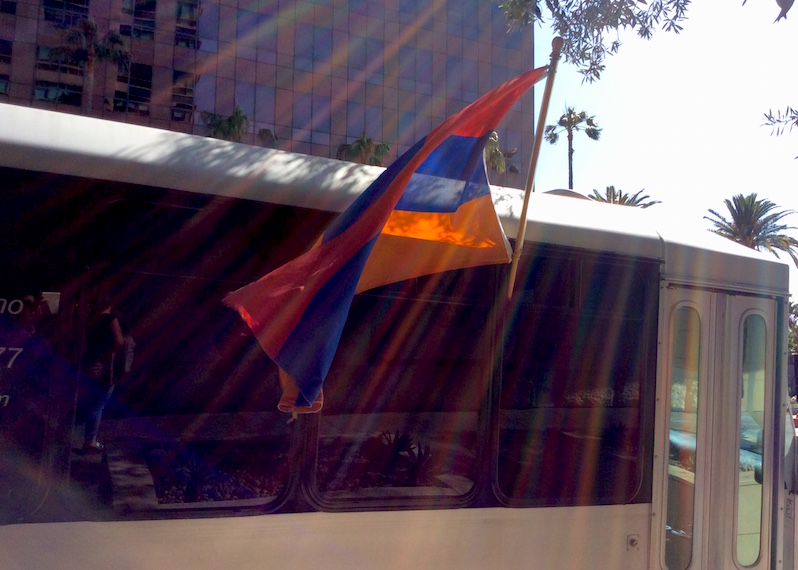 Elen Chilingaryan
Elen Chilingaryan
By Elen Chilingaryan
Elen Chilingaryan
Last week, President Barack Obama broke his promise to Armenians for the eighth time.
During his 2008 presidential campaign, Obama vowed to recognize as genocide the massacre of some 1.5 million Armenians at the beginning of the 20th century.
Instead, in his April 22 annual statement on the events, the president referred to them, in Armenian, as mets yeghern, which means “a great calamity”—a lesser designation, and not what the Armenian community in Los Angeles expected.
On April 24 this year—commemoration day for the victims—an estimated 60,000 people gathered in front of the Turkish consulate in Los Angeles. They showed up with family members and friends to demand that the U.S. and Turkey officially recognize the Armenian genocide. Some held posters that read, “A grandchild of Armenian genocide survivor,” “Justice for Armenian genocide” or “Turkey out of NATO” to make their positions clear.
Some expressed disappointment at Obama’s repeated failures to make good on his 2008 campaign promise. Among them was Rep. Adam Schiff, D-Calif., who speculates that Obama may be reluctant to make waves in Turkey by acknowledging the genocide.
But “remaining silent in an effort to curry favor with Turkey is as morally indefensible as it will be ineffectual,” he said. “How many administrations must be intimidated in silence before we realize it never changes Turkish behavior for the better and only emboldens their increasingly authoritarian regime?”
“If we want to prevent organized and mass killings of people in future, the United States and Turkey should call things by their names,” said Harout Semerdjian, an American-Armenian historian who attended the Los Angeles demonstration. “Armenian genocide is not only about Armenians. It is a question of global concern,” he added. “Armenians should not be alone in the pursuit of justice. Otherwise, organizations like [Islamic State] will feel free to do what they are doing to minorities these days.”
In the final days of the Ottoman Empire, Turkey’s predecessor, the government adopted the idea of pan-Turkism and pan-Islamism—the establishment of a Turkish empire that would include all Turkish-speaking peoples.
Factions including Serbs, Romanians, Bulgarians and Greeks had claimed their land and their independence from the empire in the mid-19th century. But Christian Armenians were seen as a hindrance to the Ottoman plan. According to historians, more than 1.5 million were killed in the territory of Muslim Turkey from the end of the 19th century until the early 1920s.
Following the genocide, Armenians spread around the world, and many of them settled in the U.S.
Today, oil-rich Turkey, which has second-largest standing military force in NATO (after the U.S.), denies committing genocide against Armenians, claiming mass killings were the consequences of World War I.
A journalist at a major newspaper in Turkey, who asked to remain anonymous for safety reasons, explains the motives for Turkey’s official position on the matter:
Turkey denies the issue for two reasons, I think. First, the state “thinks” their predecessor did what they had to for defending its territory. Armenian people of that time were collaborating with Russia—a longtime enemy for the Ottomans. And the state accuses Armenians for what has happened.
The second, and more important, reason of denying is coming from national interest stuff. Accepting the term “genocide” will have [legal] consequences for Turkey.
More than 20 governments—including France, Switzerland, Canada, Argentina, Uruguay, Russia and the European Union—and 44 U.S. states have recognized the Armenian genocide. U.S. actor and human rights advocate George Clooney traveled to Yerevan, the capital of Armenia, this year to participate in events commemorating the 101st anniversary of the massacres. He called for broader international support in acknowledging that Armenian genocide took place.
The needle may even be moving a fraction in Turkey: Starting six years ago, victims of the genocide have been honored annually in Istanbul, one of the nation’s most populous cities. On April 24, 2016, at the symbolic time of 19:15 (7:15 p.m.), hundreds of people gathered at Tunel Square. Photos of famous Armenian figures who died during the massacres were presented during the ceremony, and their names were read aloud.
The journalist from Turkey acknowledged that some Turks are willing to recognize the mets yeghern as genocide. “I think someday or other these two [groups of] people will meet somewhere between their current positions. … Maybe they both reluctantly will accept the “ethnic cleansing” concept. Who knows?”
Photo essay below (via Evrybit):
Elen Chilingaryan has been a reporter for Radio Free Europe/Radio Liberty Armenian service for four years, primarily covering social issues. She is also a moderator of the morning show at Liberty and manages the social media pages for the radio station.
Your support matters…Independent journalism is under threat and overshadowed by heavily funded mainstream media.
You can help level the playing field. Become a member.
Your tax-deductible contribution keeps us digging beneath the headlines to give you thought-provoking, investigative reporting and analysis that unearths what's really happening- without compromise.
Give today to support our courageous, independent journalists.
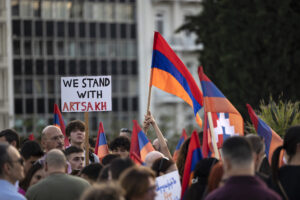
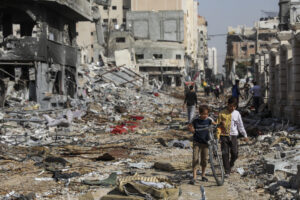
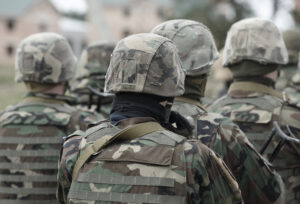
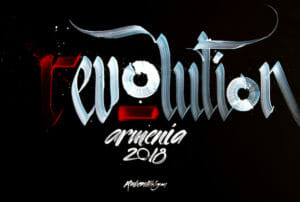
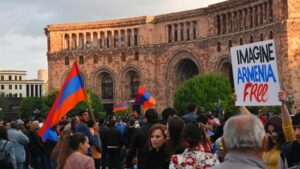

You need to be a supporter to comment.
There are currently no responses to this article.
Be the first to respond.